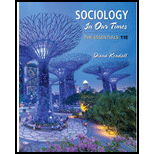
Introduction
Sociology helps us study social ties between individuals and society. When a society’s social ties are weakened, people feel more stress and may become hopeless. This stress from a weaker social fabric is compounded when one feels anxiety on the job and pressure to do well and take care of the family back home. The aggregate effect of these stressors can lead people to feel that ending their lives would be an option preferable to continuing to live and face the challenges, particularly when solutions are hard to appreciate.
Explanation of Solution
Answer and explanation
Emile Durkheim said that the bonds between people get slack when the social fabric of society is weakened. Having to move to the city to get a job, even in boom times, is a stressful choice and a person may feel detached from their social support system. Sociology provides the means by which this phenomenon can be studied and hopefully remedied. A worker who leaves home for work may feel pressure to do very well in order to make the family proud and earn enough money to help support the rest of their relatives who stayed home. The worker may send money home and still face escalating expectations from family, if the family perceives that the economy is doing well and their money demands increase accordingly. Feelings of failure, a sense that one has let their family down, and an inability to see solutions to very real and frightening problems can lead to an increase in suicidality. The protective factors that can insulate one from suicidal impulses may also erode as social support systems become less present and reliable.
Want to see more full solutions like this?
Chapter 1 Solutions
SOCIOLOGY IN OUR...:ESSEN.-MINDTAP
- humanized answers and couple of sentences for each: How did the field of gifted education evolve, and why is it important for giftedness to be recognized as an exceptionality? How do we define “gifts and talents,” and how are students identified? What are some characteristics of students with gifts and talents, and how can the information processing model (IPM) help us understand their needs? Why do students from culturally and linguistically different or socioeconomically disadvantaged homes and twice exceptional student continue to be under-identified for gifted-educational supports and services? What educational responses are needed to address the strengths and challenges of students with gifts and talents? What life course considerations are important for students with gifts and talents?arrow_forwardDescribe the difficulties that individuals may have trying to understand spoken languagearrow_forwardList and describe the ways to understand better how we learn about language and the brainarrow_forward
- 2. How would you compare the lives of poor people living in the low-income nations of the world with those in cities and rural areas of the United States? In what ways are their lives similar? In what ways are they different?arrow_forwarddiscuss the critisism of functionslism theoryarrow_forwardHow have economic crises such as the Great Depression, the 2008–2009 recession, and the COVID-19 pandemic impacted families in both practical and emotional ways? How do these events continue to shape family life today? In what ways has the definition and structure of “family” evolved in the 21st century? How do these changes reflect broader shifts in societal values, gender roles, and legal recognition of diverse relationships? What are some of the major economic and social challenges facing families today, and how do these challenges differ across social class levels, particularly for working-class and middle-class families? How do you think the increasing visibility of same-sex families, domestic partnerships, and cohabitation without marriage will influence societal norms and policies around family in the coming decades? Given current trends, what do you envision family life will look like in the future—by 2030 or 2040? How might factors like technology, economic instability,…arrow_forward
- You have decided to study global wealth and poverty. How would you approach your study? What research methods would provide the best data for analysis? What might you find if you compared your research data with popular presentations—such as film and advertising—of everyday life in low- and middle-income countries?arrow_forwardWhat are the PROs and CONs of the Guardian Mindset basd on mindsets in policing by Mike D'Antonio in a TEDx Talks presentation?arrow_forwardDiscuss one example of each of these… A time that someone gave you legitimate criticism that you could learn from. A time that someone gave unfair criticism which you should not be hurt by. A time that you criticized someone, perhaps accurately, but you delivered your criticism so harshly that the other person could not take it in. How could you have said it better?arrow_forward
 Social Psychology (10th Edition)SociologyISBN:9780134641287Author:Elliot Aronson, Timothy D. Wilson, Robin M. Akert, Samuel R. SommersPublisher:Pearson College Div
Social Psychology (10th Edition)SociologyISBN:9780134641287Author:Elliot Aronson, Timothy D. Wilson, Robin M. Akert, Samuel R. SommersPublisher:Pearson College Div Introduction to Sociology (Eleventh Edition)SociologyISBN:9780393639407Author:Deborah Carr, Anthony Giddens, Mitchell Duneier, Richard P. AppelbaumPublisher:W. W. Norton & Company
Introduction to Sociology (Eleventh Edition)SociologyISBN:9780393639407Author:Deborah Carr, Anthony Giddens, Mitchell Duneier, Richard P. AppelbaumPublisher:W. W. Norton & Company The Basics of Social Research (MindTap Course Lis...SociologyISBN:9781305503076Author:Earl R. BabbiePublisher:Cengage Learning
The Basics of Social Research (MindTap Course Lis...SociologyISBN:9781305503076Author:Earl R. BabbiePublisher:Cengage Learning Criminalistics: An Introduction to Forensic Scien...SociologyISBN:9780134477596Author:Saferstein, RichardPublisher:PEARSON
Criminalistics: An Introduction to Forensic Scien...SociologyISBN:9780134477596Author:Saferstein, RichardPublisher:PEARSON Sociology: A Down-to-Earth Approach (13th Edition)SociologyISBN:9780134205571Author:James M. HenslinPublisher:PEARSON
Sociology: A Down-to-Earth Approach (13th Edition)SociologyISBN:9780134205571Author:James M. HenslinPublisher:PEARSON Society: The Basics (14th Edition)SociologyISBN:9780134206325Author:John J. MacionisPublisher:PEARSON
Society: The Basics (14th Edition)SociologyISBN:9780134206325Author:John J. MacionisPublisher:PEARSON





